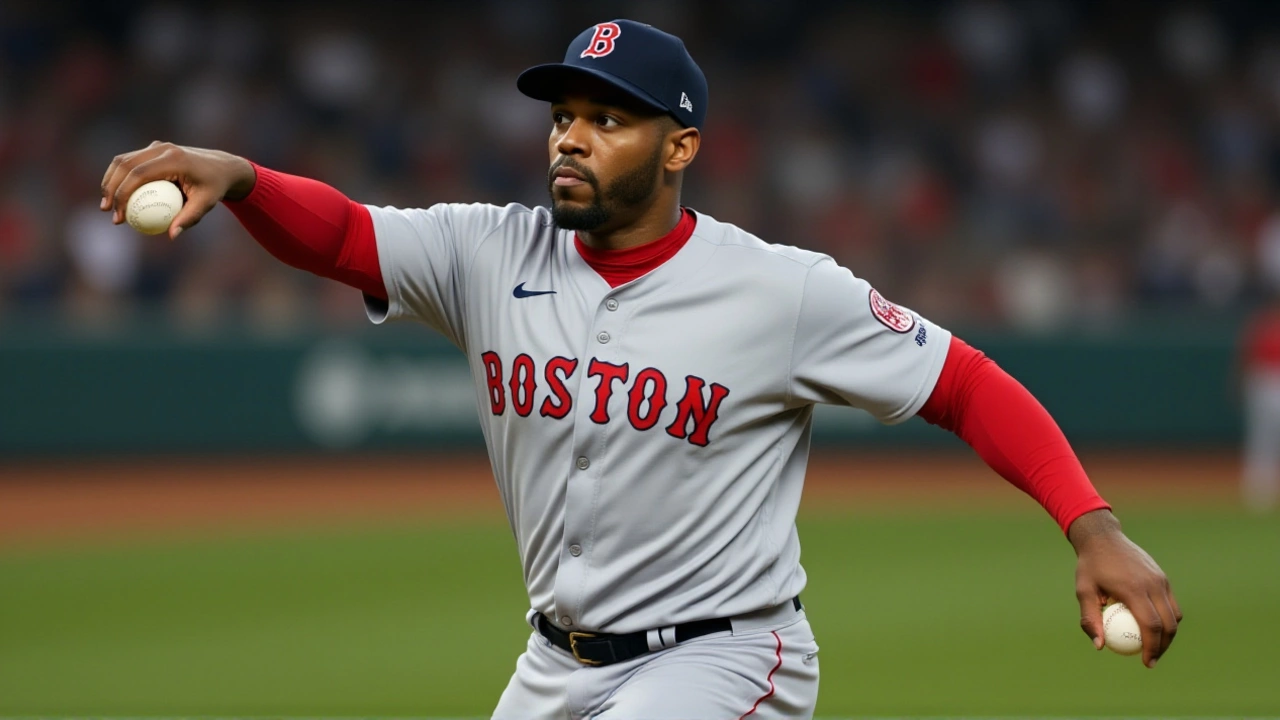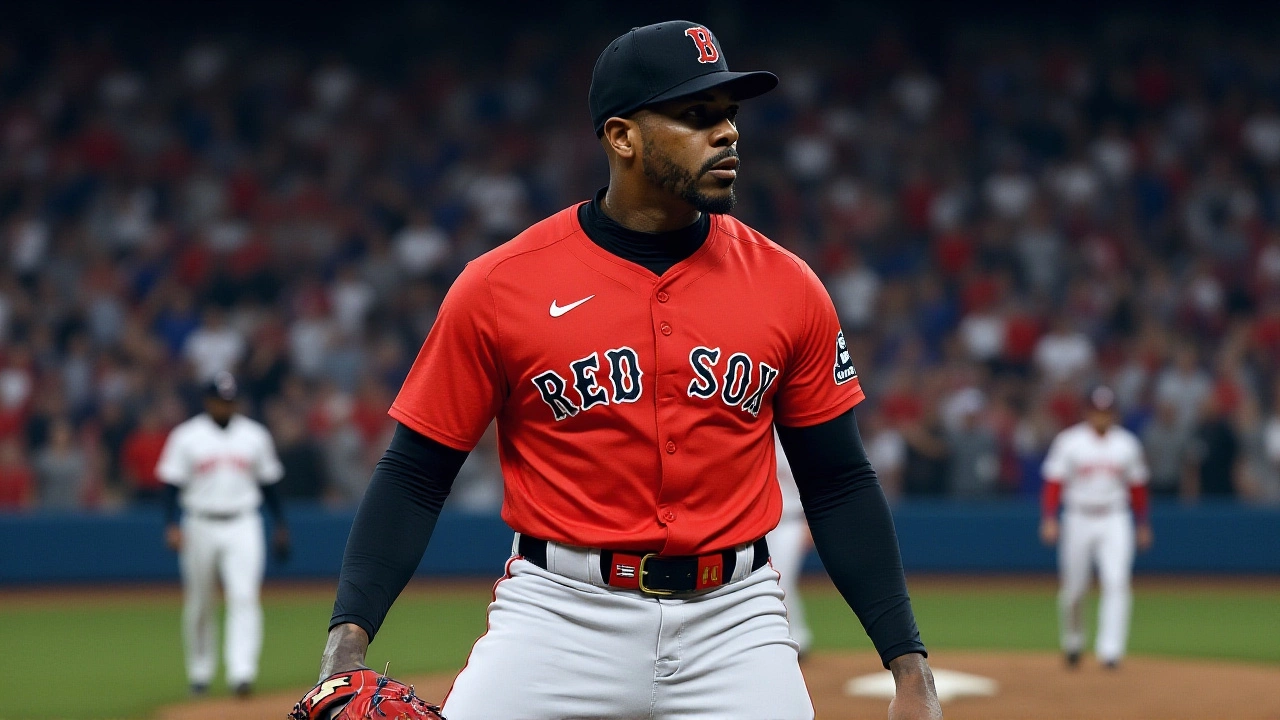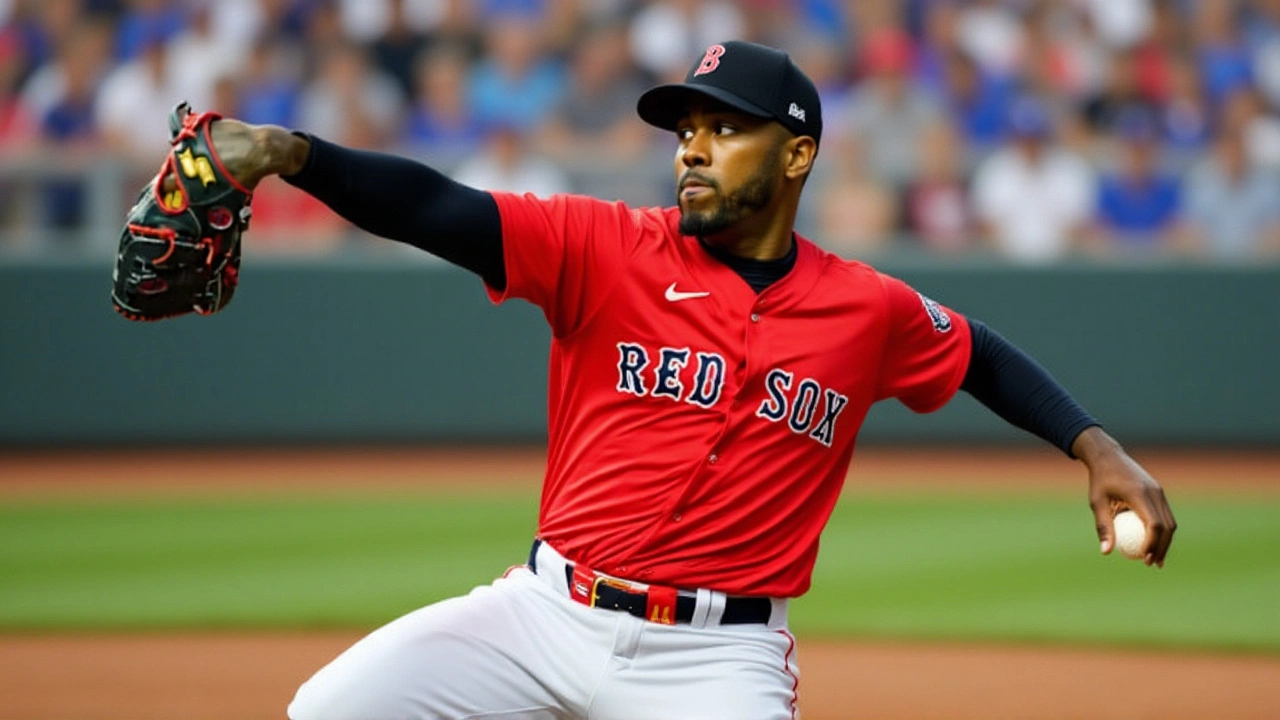Aroldis Chapman inks $13.3M extension with Red Sox through 2026

When Aroldis Chapman, closer of the Boston Red Sox signed a contract extension on Sunday, the win‑or‑lose stakes of Fenwick Park’s bullpen instantly shifted.
The deal locks the Cuban‑born flamethrower into Boston for the 2026 season at a guaranteed $13.3 million, with a 2027 performance‑based vesting option that could push the total value to roughly $26 million. The Red Sox announced the news after Francys Romero broke the story, and Chris Cotillo of MassLive supplied the financial specifics.
Background: Chapman's road to Fenway
Chapman’s journey to Boston reads like a seasoned pitcher’s highlight reel. After 16 seasons of thunderbolts with the Cincinnati Reds, Chicago Cubs, New York Yankees and Atlanta Braves, the 34‑year‑old signed a one‑year, $10.75 million contract with the Red Sox in December 2023. The move was seen as a low‑risk, high‑reward gamble—Boston needed a reliable closer after a shaky 2023 postseason.
In his first half‑season in Boston, Chapman has been nothing short of electric. A 1.02 ERA across 53 innings, 76 strikeouts and 27 saves have placed him among the league’s elite relievers. His performance earned him a spot on the 2024 American League All‑Star GameGlobe Life Field, Arlington, Texas, his first All‑Star nod since 2021 with the Yankees.
Extension details and financials
The one‑year guarantee for 2026 comes with a clear trigger: pitch at least 40 innings and pass a post‑season physical. Hit both marks, and the 2027 option becomes fully guaranteed, pegged at a comparable $13 million figure. If Chapman falls short, the Red Sox still retain a $13.3 million guarantee for 2026—still a premium for a closer who can finish games at will.
- 2026 salary: $13.3 million (guaranteed)
- 2027 vesting option: $13 million if 40+ innings pitched and physical cleared
- Total possible value: ~$26 million over two years
- Contract length: 2026 season with optional 2027 year
- Performance clause ties pay to durability, a nod to Chapman's recent health record
Boston’s front office, led by Chaim Bloom, emphasized the “win‑now” mentality behind the move. “Aroldis gives us a certainty we haven’t had in the ninth inning for years,” Bloom said in a post‑game interview at Fenway Park. “If he stays healthy, we’re willing to pay for that peace of mind.”
Performance this season
Statistically, Chapman’s 2024 numbers are staggering. His 1.02 ERA ranks third among qualifying relievers, while his 1.43 WHIP (walks plus hits per inning pitched) underscores his command. The strikeout rate—1.44 K per inning—is the highest of any closer with at least 50 innings pitched this year.
Beyond the raw numbers, the veteran’s presence has altered the Red Sox’s approach to high‑leverage situations. In July, Boston converted a potential loss against the Pittsburgh Pirates into a win when Chapman slammed the door on a two‑run ninth, his 28th save.

Reactions from teammates and analysts
Teammates have taken notice. Shortstop Rafael Devers told reporters, “When Aro fires, you stop worrying about that last out. It’s a huge lift for all of us.” Pitching coach Brian Sabean added that Chapman’s fastball—often topping 100 mph—has “forced hitters to sit back and think twice before swinging.”
Analysts on ESPN’s Baseball Tonight noted that the extension reflects a broader trend: teams are increasingly willing to front‑load money on proven closers rather than gamble on younger arms. “Boston is betting on veteran reliability,” said baseball economist Megan Chambers. “If Chapman hits the 40‑inning threshold, the Red Sox essentially lock in a top‑five closer at a cost comparable to a mid‑range starter.”
What the deal means for Boston’s bullpen
With Chapman secured, the Red Sox can now focus on shoring up the rest of the bullpen. The multi‑year contracts already in place for relievers like Matt Bass and Kenley Jansen create a layered approach: Chapman as the high‑leverage finisher, Bass handling middle‑relief, and Jansen serving as a setup specialist.
Should Chapman stay healthy, Boston’s win‑probability added (WPA) when he enters a game climbs to .222—among the highest for any reliever this season. That metric translates into roughly 14 additional wins over a full 162‑game schedule, a margin that could be the difference between a playoff berth and a middling finish.
In short, the extension buys Boston not just a fastball, but a strategic advantage that reverberates through the entire pitching staff.
Key facts
- Aroldis Chapman secured a $13.3 million guarantee for 2026.
- Vesting option for 2027 hinges on 40 innings pitched and a clean physical.
- 2024 season stats: 1.02 ERA, 76 K, 27 saves in 53 innings.
- Red Sox front office cites bullpen stability as primary motive.
- Extension could total ~$26 million over two years.

Frequently Asked Questions
How does Chapman's extension affect the Red Sox’s chances of making the playoffs?
Securing a closer of Chapman’s caliber boosts Boston’s win‑probability added in tight games to over .22, roughly translating to 14 extra wins over a full season. That swing can be the difference between a wild‑card spot and missing the postseason.
What are the conditions for the 2027 vesting option?
Chapman must pitch at least 40 innings during the 2026 campaign and pass a post‑season physical that shows no concerning medical issues. If both are met, the $13 million salary for 2027 becomes fully guaranteed.
How does this contract compare to other recent closer deals?
Boston’s deal is on the high end for a single‑year guarantee but mirrors the market trend of paying premium for proven ninth‑inning performers. For context, the New York Yankees paid $13 million to Clay Holmes for 2025, while the Dodgers gave Trevor Martin a $12 million guarantee for 2025.
Will Chapman’s performance affect the Red Sox’s free‑agent strategy?
Yes. With a reliable closer locked in, Boston can allocate more of its payroll toward starting rotation depth and middle‑relief pieces, potentially shifting their free‑agent focus from the bullpen to the rotation.
What impact does Chapman’s All‑Star selection have on his market value?
Being voted an All‑Star solidifies Chapman’s elite status and justifies the Red Sox’s willingness to pay top‑tier money. The accolade also signals to other teams that his performance isn’t a fluke, reinforcing his bargaining power in future negotiations.